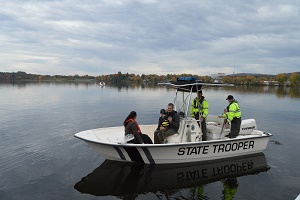The Marine Division is responsible for recreational boating safety on all Vermont’s waterways. This task is accomplished by providing boating safety education, patrolling of Vermont’s waterways and enforcement of Vermont’s boating laws.
For information about boating in Vermont, check out the online Handbook of Vermont Boating laws and Responsibilities.
Boating Safety Education
Boating safety education is required for any motor boat operator (12 years of age or older) born after January 1, 1974. Boat Vermont 8 hour classroom courses are sponsored by the entities listed below. The Boat Vermont internet course is available online for those Vermont residents unable to attend a classroom course.
 Nonresidents of Vermont (reciprocity): Your state’s NASBLA (National Association of State Boating Law Administrators) approved course as well as any NASBLA approved boating safety course is accepted by Vermont.
Nonresidents of Vermont (reciprocity): Your state’s NASBLA (National Association of State Boating Law Administrators) approved course as well as any NASBLA approved boating safety course is accepted by Vermont.
Boating Safety Reminders
- Know your boating and swimming ability. Water conditions can change quickly and at time without notice so it’s important to ensure you’re not getting into a situation where you’ll over exert your ability as a swimmer or over extend your navigation skills.
- Personal flotation devices are vital. You should have a personal flotation device for everyone aboard your boat — and anyone under 12 must wear the PFD at all times. Ensure the devices are in good shape before you leave shore. Make sure they fit, and that people on your boat know how to use them.
- Alcohol and boating don't mix. It's illegal to operate a boat while under the influence. According to the Lake Champlain Committee, as many as 80 percent of all boating accidents involve alcohol. Impairment can affect your ability to swim as well.
- Take a boating safety course. In Vermont, they're required for everyone born after January 1st, 1974.
- Know the proper procedures and requirements for making a distress call, the right-of-way rules on the water, and the types of lights your boat must have.
- File a "float plan" — a copy of your anticipated itinerary — with a friend or family member on land, and keep that person updated on any changes on your journey.
- Check the weather forecast before you go, and know what you will do in case of sudden inclement weather. Warm, sunny days are ideal for boating, but you can’t always predict when a storm will roll in. Varying gusts of wind and choppy water are signs of an approaching storm.
- Don’t swim alone. Use the “buddy system” and take a friend or responsible adult with you who is a strong swimmer. Make sure you watch out for each other. Even when a lifeguard is around, it is best to have a “buddy”.

